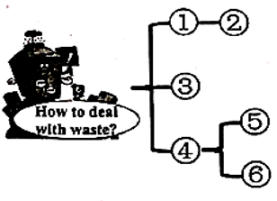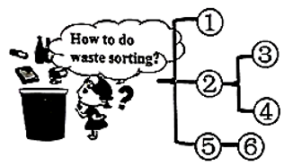Sam and his friend Bob, both 5, entered a painting competition. Bob won! Sam felt blue and left 1_.
As soon as Sam 2 home, he told Papa, "I worked hard on my picture. I made it the best I could. I wanted to win. "
"You did work hard, "said Papa. "3 is a fine picture. Ill hang it in my office. "Mama gave Sam a hug and said, "I hope you congratulated Bob."
Sam shook his head, "Bob was too busy getting his photo taken. "Then he went to his room. He sulked (生闷气). He didn't feel like doing anything. Some time later, he got very 4. He wondered what Bob was doing. He remembered the fun they had, painting their pictures together
He decided to do something, 5 he took out some paper and his painting set. He painted another picture, one 6 a ship in it. He knew Bob loved ships.
Under the ship, he printed in big red 7: C-O-N-G-R-A-T-U-L-A-T-I-O-N-S!
That was the biggest word he knew.
That afternoon, Sam walked to Bob's house and gave Bob the 8.
"Thanks," said Bob. "I love ships. What's the 9 word?"
"Congratulations," said Sam.
"Wow! Thanks again," said Bob. "This is much better than getting my photo taken.
And happily they went to ride bikes together.
Friendship is much better than 10, isn't it?

Characters: a judge (法官) Mike (a painter) Peter (a cook)
Setting: a courtroom (法庭)
A judge is sitting behind a desk. Mike and Peter are standing in front of her.
Peter: Your honor. This man lives in a room above my restaurant. I heard him telling a friend that he was stealing from me.
Mike: Smells, your honor! I just take the smells of the food coming up from the restaurant.
Judge: (Looking at Mike) What do you do with the smells?
Mike: The smells help me imagine that I am eating a fine dinner.
Judge: (To Peter) And how much do you want for these smells, sir?
Peter: The 5 coins he always carries.
Mike: But my mother gave me the coins to save me when in need.
Judge: (To Mike) Drop the coins onto the table, one at a time. (Mike drops the coins.)Case dismissed (结案).
Peter: What do you mean? I didn't get paid!
Judge: You want the SMELLS paid. Mike has now paid you in SOUNDS—the sounds of the coins.
Last year, I went to Italy as an exchange student. Before leaving, I asked my mother what gifts I should take to the teachers and the students there. Mom said that the Chinese fan was a good choice, for China is praised as "the Fan Kingdom". I couldn't agree more, because it is more than a tool for cooling. It's also an important part of Chinese culture.
I went shopping and bought three kinds of Chinese fans. The first kind was the feather (羽毛) fan for the teachers, which was made of bird feathers. It was the symbol of Zhuge Liang, a very smart man in ancient China. The fans I bought for the girls were silk fans. They were also called" round silk fans". Fans of this kind were made of silk with paintings of beautiful women, birds or flowers. They were very popular with women of all ages. As for the boys, I picked the folding fans from Rongchang, a place in the west of Chongqing. The folding fans were made of paper and bamboo and there were great paintings and calligraphy (书法) on them.
At the welcome party in Italy, my new teachers and classmates were all excited to get the wonderful fans. And they were even more excited after learning about the stories and culture behind them.
 B .
B .  C .
C .  D .
D . 
In China, each year we produce about 150 million tons of city waste according to a report. Where does the waste go? People usually burn or bury (埋) it. On the other hand, we receive waste from some developed countries. We get useful materials from it. What about the useless part? Still burned or buried. But is it a proper way?
Waste pollutes the environment, harms people's health and causes animals to die. It also gets in the way of green and sustainable development. We can't make money at the cost of the environment.
We should leave clean water and green mountains to our next generations (一代人).
China is getting really serious about waste now.
We are taking less waste from developed countries. From January 2018, China started to stop 24 kinds of waste coming into our country. And more laws and rules about dealing with waste have been made. Anyone who breaks the law will be punished.
China also tries to put waste into good use. One example is the waste electricity factories. They burn waste to make electricity in a green way. No harmful gases or water will get into the environment.
The Chinese government is encouraging people to do waste sorting(分类). Cities like Shanghai,
Chongqing and Beijing have their own sorting systems. More will join them soon. As President Xi Jinping said during a visit to Shanghai, waste sorting is a new fashion (时尚). More and more people are forming the habit of separating their waste.
(①=Paragraph1 ②=Paragraph2 ③=Paragraph 3 ④=Paragraph4 ⑤=Paragraph 5
⑥=Paragraph 6)
 B .
B .  C .
C .  D .
D . 
Facial recognition technology (人脸识别技术) is widely used today. For example, police use it to search for bad guys. It's also used to unlock phones or doors.
Now, a similar technology, known as facial detection (探测), is entering a new field: the business of advertising (广告).
Such systems are going through tests in a small number of stores. One facial detection system can judge a person's "happiness" or "fear" level. That helps businesses see how people feel as they lo at products or advertisements in the store. Another system can detect whether someone is wearing eyeglasses. If so, stores can send advertisements for new glasses to him.
Facial detection technology is also placed inside some large advertising boards. Cameras in those boards can detect information like people's ages and five levels of feelings——from "very happy" to "very unhappy".
Supporters of the technology say it could improve buyers' experience by showing products they might like or by offering them products at lower prices.
Some are against the idea of using such systems. Pam Dixon, the head of a privacy (隐私) group, is one of them. She thinks . For example, a business could raise the price of a product according to a person's age and feelings.
However, one store testing the technology explained they wouldn't store people's information like names or ages. And the advertising board system maker said it didn't keep any personal information or record any videos.
|
A. What about this one? B. Can you help me? C. It's too expensive. D. 25 yuan. E. What can I do for you? F. I will take it. G. He is interested in fishing. |
A: Good morning.
B: I'm looking for some books for my father. His birthday is coming.
A: Well. What is he interested in?
B: He goes fishing every week.
A: It's a good hobby. Is he god at it?
B: No, not really. He often comes back without any fish.
A: I see.
B: Let me have a look. Oh, it's for beginners.
A: Yes. It's very helpful. I'm sure your father will like it.
B: Hmm…Thanks. How much is it?
A:
B: Here you are.
A: Thank you.
How can I become a better person? This question has been in my head for long. As students, we spend most of our time studying. I know learning at school, of course, makes us better persons, but I always dream of doing more.
Last year, I got to know a group of autistic (患自闭症的) children. We called them "the Snails (蜗牛)". It was hard to communicate with them at first, because they wouldn't like to. After a two-week training, I became more skilled. I got closer to them day by day. To my surprise, I found that every one of "the Snails" had his or her own talent and their colorful pictures on the wall attracted my special attention, though it was difficult to tell what they were trying to express.
Moved by their pictures, I decided to hold a charity (慈善) sale. We walked on the busy street, selling their creative pictures. We sold 60picturesthat day. People thought their pictures were full of imagination.
Back to the question about how to become a better person, I think I am lucky enough to get my own answer.
Why or why not?
It's normal for the human mind to wander (走神). So many things may fill your mind and pull your thoughts in different directions. This isn't always . Sometimes a wandering mind can lead to a new creation. However, wandering thoughts can also stop you getting things done, keep you up at night, or hurt your health. Don't worry. Try the following practice.
Doing Exercise and Activities
Slow down and let your mind focus (专注) on your breathing. By controlling your breathing, you bring your to work together with your body. Once you lose interest in what you're doing, you can take a break from it. Go for a walk, do some exercise, take a shower or even lie down and think about . These activities help a lot.
Focusing on Tasks You're Doing
Do one task at a lime. It won't slow you down. Instead, it keeps your mind focused and you'll be able to get more done . While doing tasks, don't look around from time to time, If there's something keeping your mind wandering, allow yourself a specific (特定的) time to worry, think or plan. the time is up, refocus on your next task.
Controlling Worrying Thoughts
Writing down or sharing your worries helps to get them out of your head. When there's a big task, it's understandable to put it off. But by it bravely and trying to solve it, you can get away from your worrying thoughts. If it doesn't work after you've tried everything, that there are always things you can't change.

要求∶
1)80-120词, 开头已给出, 不计入总词数;
2)文中不能出现自己的姓名和所在学校的名称。
参考信息:
1)描述问卷调查结果(频率、方法);
2)介绍自身口语情况(水平、打算·…);
3)….
The results of the survey show that 17% of the students hardly ever practise speaking English.